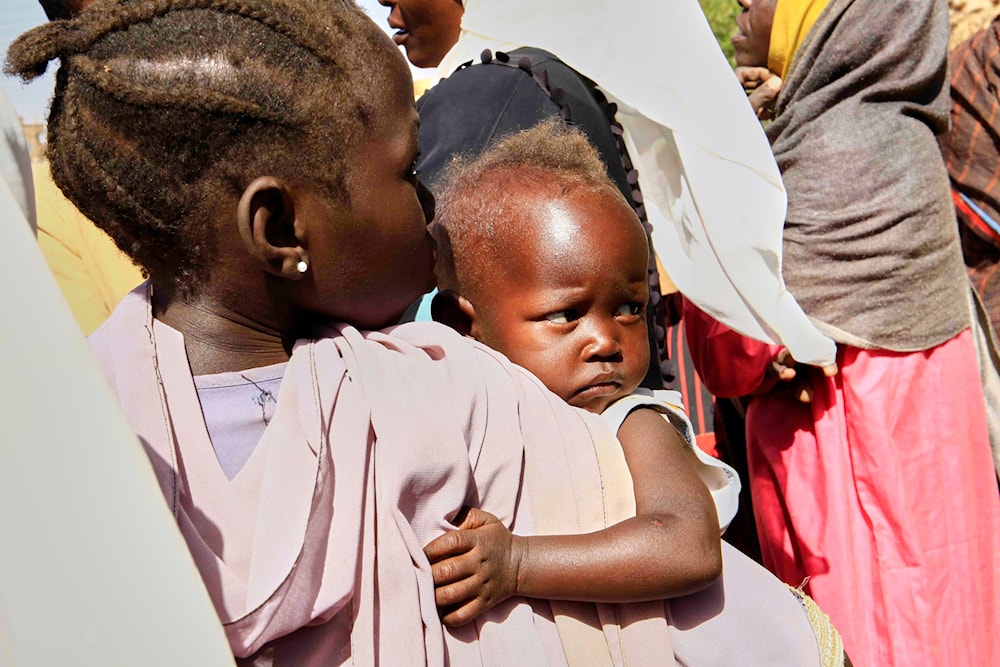58 mln people at risk of losing aid due to funding shortfall: WFP
With funding running low, the World Food Programme warns that 58 million people are at risk of losing humanitarian aid.
-

A Sudanese displaced woman holds her child as they take shelter in a school after being evacuated by the Sudanese army from areas once controlled by the paramilitary Rapid Support Forces (RSF) in Omdurman, Sudan, located across the Nile River from Khartoum, on March 23, 2025. (AP)
The United Nations World Food Programme (WFP) issued a warning on Friday that 58 million people in 28 of its most critical crisis response operations could lose life-saving assistance unless urgent new funding is secured.
The WFP is facing a significant 40% funding reduction for 2025 compared to the previous year. This sharp decline, combined with record levels of people in need, has created an unprecedented crisis for millions worldwide who rely on food aid.
The program reports that 343 million people globally are experiencing severe food insecurity, driven by ongoing global crises, including conflicts, economic instability, and climate-related emergencies.
A breakdown
The program operates in 28 countries, including Sudan, where it requires $570 million to provide monthly support to over 7 million people. Supply chains in Sudan are predicted to face disruption as soon as April.
In South Sudan, the World Food Programme requires $281 million to provide food and nutrition support to 2.3 million people fleeing war, extreme climate conditions, and economic collapse.
In the Democratic Republic of the Congo, the World Food Programme requires $399 million to assist 6.4 million people.
In the occupied Palestinian territories, the WFP's emergency efforts call for approximately $265 million over the next six months to support around 1.4 million Palestinians in Gaza and the West Bank. An additional $34 million is urgently needed to aid 40,000 families in the West Bank.
Read next: WFP condemns attack on Gaza aid convoy
In Syria, the World Food Programme requires $140 million to deliver food and nutrition assistance to 1.2 million people each month. Without new funding, the WFP faces supply disruptions in August, which could result in cutting off food aid to one million of the most food-insecure individuals.
In Lebanon, the World Food Programme needs $162 million to provide food for 1.4 million people. A significant funding shortfall is already hindering the delivery of food assistance to the most vulnerable Lebanese displaced individuals and Syrian refugees, intensifying instability and escalating social tensions. As Lebanon's economic crisis and government transition persist, food insecurity continues to worsen, with one in three people already facing acute hunger.
In Myanmar, the World Food Programme needs $60 million to deliver life-saving food assistance to 1.2 million people.
In Haiti, the World Food Programme requires $10 million to provide food for 1.3 million people.
In the Sahel and Lake Chad Basin, the WFP needs $570 million to deliver life-saving food and nutrition assistance to 5 million people.
WFP shuts down southern Africa bureau
Earlier this month, the United Nations World Food Programme (WFP), which depends on US contributions for nearly half of its funding, announced on Monday that it is shutting down its Southern Africa bureau due to financial constraints. The decision comes as the region grapples with a severe drought.
As part of its "America First" policy, US President Donald Trump’s administration has significantly reduced foreign aid contracts, including funding for critical UN programs. While the WFP did not specify the exact financial impact of these cuts, regional spokesperson Tomson Phiri acknowledged that "the donor funding outlook had become constrained."
The US remains the WFP’s largest donor, contributing $4.5 billion to its $9.8 billion budget last year. The agency provides food and cash assistance to populations facing hunger due to wars, climate change, and crop failures.
'Brutal funding cuts' for aid threaten millions
Last week, the UN refugee head said Thursday, as he readied staff for mass layoffs due to a US foreign aid budget embargo, drastic assistance cuts throughout the world are endangering millions of lives.
Filippo Grandi emphasized that "brutal funding cuts in the humanitarian sector are putting millions of lives at risk," adding that "the consequences for people fleeing danger will be immediate and devastating."
In an internal statement written to workers internationally and obtained by AFP, the United Nations High Commissioner for Refugees warned that the agency's financial uncertainties would "unavoidably result in a significant reduction in the size of our workforce."
"There is no doubt that the next few months will be very difficult," he stated, detailing how "we have no choice but to take decisive action which will leave no part of our organization or our work untouched. Refugees will be impacted. Our operations will be impacted. Many colleagues will be impacted."

 5 Min Read
5 Min Read








